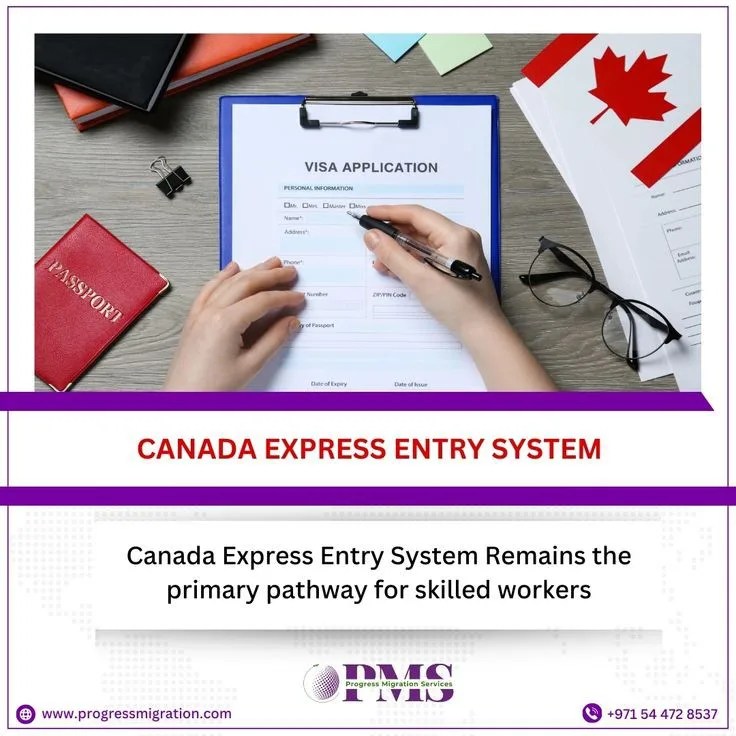Table of Contents
- Introduction
- 1. Overview of Express Entry System
- 2. What’s New in the Express Entry Scoring?
- 3. How the New CRS System Benefits Tech Professionals
- 4. Tech Professionals Benefit from Education and Language Proficiency
- 5. The Impact of Provincial Nominee Programs (PNPs)
- 6. How to Improve Your CRS Score as a Tech Professional
- Conclusion
- FAQs
Introduction
Canada’s Express Entry system, known for managing permanent residence applications for skilled workers, has undergone significant changes in 2025. With the aim of attracting more skilled workers to fill labor gaps, particularly in the technology sector, Canada has revamped its scoring system. These changes have created new opportunities for tech professionals, offering a streamlined path to permanent residency. This article will break down the key aspects of the new Express Entry scoring system and how it particularly benefits tech workers.

1. Overview of Express Entry System
Canada’s Express Entry system is a points-based immigration system that manages applications for three main federal economic immigration programs:
- Federal Skilled Worker Program (FSW)
- Federal Skilled Trades Program (FSTP)
- Canadian Experience Class (CEC)
Candidates are ranked using the Comprehensive Ranking System (CRS), which assigns points based on factors such as age, education, work experience, language proficiency, and other criteria.
2. What’s New in the Express Entry Scoring?
In 2025, Canada introduced several key changes to the CRS to help attract skilled workers in high-demand fields. This shift includes:
- Increased points for tech-specific skills
- Additional points for post-secondary education
- Higher weight for Canadian work experience
These changes are aimed at addressing critical skill shortages in the tech industry, from software development to data science, artificial intelligence, and cloud computing.

3. How the New CRS System Benefits Tech Professionals
Tech Talent Shortage in Canada
Canada has seen significant demand for tech professionals in recent years, especially in cities like Toronto, Vancouver, and Montreal. The new scoring system is designed to help fill this gap by awarding more points to tech professionals.
Increased Points for Tech-Specific Skills
The Canadian government has recognized the importance of tech talent by awarding additional CRS points to candidates with skills in high-demand areas, such as:
- Software engineering
- Data analysis
- Cloud computing
- Cybersecurity
- AI and machine learning
- Blockchain development
These fields are essential to Canada’s economic growth, and the increased points reflect the government’s focus on attracting skilled tech workers.
Tech Professionals with Canadian Work Experience
Candidates who have worked in Canada on a temporary work permit are now eligible for additional CRS points under the new system. This adjustment ensures that tech professionals who have gained valuable Canadian work experience are given more weight during the selection process.

4. Tech Professionals Benefit from Education and Language Proficiency
More Points for Education
The new system places greater emphasis on the educational background of tech professionals. Individuals with degrees or diplomas in STEM (Science, Technology, Engineering, and Mathematics) fields can now earn higher points, helping them achieve a more competitive CRS score.
Language Proficiency
Language proficiency has always been an essential part of the CRS. The new system still awards points based on language skills in English or French, but tech professionals can earn bonus points if they demonstrate high proficiency, particularly in areas like coding and technical writing.
5. The Impact of Provincial Nominee Programs (PNPs)
Some provincial nominee programs (PNPs) offer additional points to candidates with tech skills. Provinces like British Columbia, Ontario, and Quebec have tech-focused PNP streams designed to attract individuals with the skills that are needed in their local economies. These streams give tech professionals the opportunity to earn extra CRS points, increasing their chances of receiving an invitation to apply for permanent residency.

6. How to Improve Your CRS Score as a Tech Professional
1. Gain Canadian Work Experience
Working in Canada, even on a temporary work permit, can boost your CRS score by providing you with additional points for Canadian work experience.
2. Improve Your Language Skills
Tech professionals who can demonstrate proficiency in English or French will have an edge in the CRS system. Consider taking language tests like IELTS or CELPIP (for English) or TEF (for French) to improve your score.
3. Upgrade Your Education
Having a degree from a Canadian university can offer you more points under the CRS. If possible, consider furthering your education or taking short-term programs in Canada.
7. How the New System Enhances Canada’s Tech Industry
By prioritizing skilled tech professionals, Canada is positioning itself as a global leader in technology and innovation. The new Express Entry scoring system makes it easier for tech professionals to secure permanent residency, contributing to Canada’s competitiveness in the global tech market. Additionally, Canadian tech companies stand to benefit from an influx of talent, which will help them address the growing demand for tech solutions and services.

8. Future Outlook: What’s Next for Tech Professionals in Canada?
Canada’s tech sector is poised for growth, and the government’s focus on attracting skilled workers through Express Entry reflects this. As the demand for digital services and tech infrastructure increases, Canada is likely to continue making adjustments to its immigration policies to ensure it remains at the forefront of technological advancement.
Conclusion
Canada’s new Express Entry scoring system in 2025 presents a unique opportunity for tech professionals to secure permanent residency. With more points for tech-specific skills, Canadian work experience, and education, the system now more effectively prioritizes skilled workers who can contribute to Canada’s growing tech industry. For those with the right qualifications and experience, this is the perfect time to consider making Canada your new home.
FAQs
1. How does the new Express Entry scoring system help tech professionals?
The new system offers additional CRS points for skills in high-demand tech fields, Canadian work experience, and STEM-related education.
2. Can I improve my CRS score as a tech professional?
Yes, by gaining Canadian work experience, improving your language proficiency, and upgrading your education, you can increase your CRS score.
3. What provinces have tech-focused Provincial Nominee Programs?
Provinces like British Columbia, Ontario, and Quebec have dedicated streams for tech professionals under their PNPs.
4. What are the key tech skills recognized by the new Express Entry scoring system?
Skills in software engineering, AI, data analysis, cloud computing, cybersecurity, and blockchain development are highly valued.
5. How will the changes in the scoring system impact Canada’s tech industry?
The changes will attract more skilled workers to Canada’s tech sector, driving innovation and helping businesses meet the growing demand for digital solutions.



